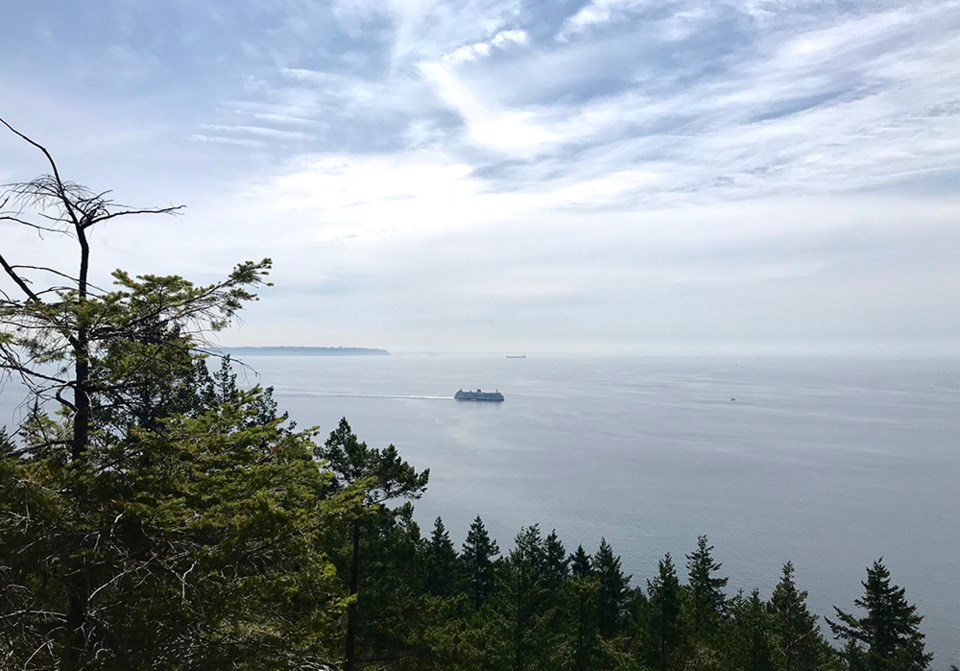Results from Phase Two of Metro Vancouver’s public engagement on the Cape Roger Curtis park shows a stark divide between how the current proposal is viewed on and off-island.
The second of three engagement sessions regarding how to proceed with Metro Vancouver’s 97-hectares of recently purchased space at the Cape took place from July 29 to Aug. 16. It consisted of two in-person open houses, two virtual webinars, and the opportunity to provide feedback online or via email.
In a summary of the results released in late September, Metro Vancouver said around 1,350 people provided feedback through the different methods, with the vast majority coming through the online feedback form (1,100).
Of those online participants, nearly half (48%) of them were from Bowen Island. Vancouver-based respondents were the next highest group participating at 22 per cent.
Like Phase One, answers were separated between Bowen Island and the rest of Metro Vancouver. In terms of overall views toward the proposal, just a quarter of Bowen residents expressed support or strong support, compared to almost triple this amount (68%) from off-island. On the flipside, nearly three-quarters of island respondents said they either opposed or strongly opposed the plan (71%), with the same response at 24 per cent from Metro Van residents.
Unsurprisingly the element with the most variance between the two groups related to overnight camping. The most contentious part of the proposal so far, when asked about the current number of suggested overnight sites the category receiving the highest approval rate from Bowen residents was walk-in/bike/shuttle camping with 15 per cent, with another eight per cent saying they’d like to see more of these sites. High numbers of opposed ranged from 78 per cent saying the total number of walk-in/bike/shuttle sites were too many, to 93 per cent voicing opposition to the number of drive-in sites.
Among Metro Van residents support for the walk/bike/shuttle total was 38 per cent, with another 25 per cent saying they’d like to see more. Vehicle sites received 41 per cent support with eight per cent saying they’d like more, though the majority of answers (51%) said there were too many proposed. Group camping also reached 51 per cent opposition, with 48% saying they liked the current amount or wanted more.
Metro Vancouver’s draft vision of the park received 33 per cent support from Boweners, and 59 per cent objection, compared to 73 per cent support from off-island. The organization’s guiding principles notched similar numbers, with 37 per cent in support from Bowen (46% opposed), and 75 per cent support from the rest of the region.
A day-use parking system has been explored as a way to limit vehicles coming onto the island during peak times such as the summer or weekends. The idea garnered 40 per cent support among Bowen residents with 46 per cent opposed. Fifty-six per cent of answers from Metro Vancouver liked the sound of that system, compared to 25 per cent against.
One area which did find support across the sound was Metro Vancouver’s plans for ecosystem protection and restoration, gathering 60 per cent support from Bowen and 82 per cent from the mainland. Twenty-seven per cent of Boweners were against this part of the proposal.
In a summation of the numbers, Metro Vancouver wrote “Those who support the concept expressed that having access to a park and/or camping near the Lower Mainland is a great opportunity to access nature and provide environmental education. There is acknowledgement that further technical studies on transportation, infrastructure, and habitats should be conducted prior to implementing the park and/or campground. Additionally, there is suggestion to include direct passenger ferry and water access to the cape to minimize strain on the ferry and local roads.”
Regarding opposition, Metro Van wrote “Participants opposing this concept expressed that it does not align with protecting and restoring the environment, citing issues with the question as they supported protecting and restoring the environment but opposed overnight site use. There was broad concern about the feasibility of the concept as current infrastructure (e.g., water supply, emergency services), and transportation (ferry access, road access) cannot support park or overnight use."



